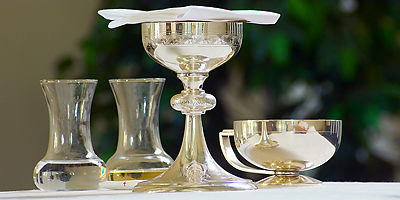
 Becoming an extraordinary minister of holy Communion is one of the most important ways men and women can serve the church.
Becoming an extraordinary minister of holy Communion is one of the most important ways men and women can serve the church.
They distribute Communion at Mass, and take the Body of Christ to Catholics who are homebound, or in hospitals and nursing homes.
And as the title reflects, this is important work. Father Bryan P. Babick, vicar for divine worship and sacraments for the Diocese of Charleston, said “an extraordinary minister should be someone whose faith is obvious and deep, especially in the Eucharist, and who is dedicated to their parish.
“It can’t be someone right off the street or someone who has a question on what they believe,” he said.
“Immensae Caritatis—On Facilitating Reception of Communion in Certain Circumstances,” a document issued by the Vatican’s Congregation for Divine Worship and the Discipline of the Sacraments, states:
“The faithful who are special ministers of Communion must be persons whose good qualities of Christian life, faith, and morals recommend them.”
Men and women who distribute holy Communion should lead prayerful lives and be completely aware of the importance of the sacrament, said Deacon Jerome P. Remkiewicz, who leads the ministry at the Cathedral of St. John the Baptist in Charleston.
“If someone wants to volunteer, I try to find out if they have a respect and devotion to the Eucharist,” said Cecilia Velte, who organizes extraordinary ministers at Blessed Sacrament Church in Charleston. “Many people show that devotion, for instance, through attending adoration,” she said.
People most often volunteer through annual appeals in their parish, although sometimes a pastor specifically asks them but all must be approved by the priest and undertake training before beginning their service.
Instruction includes how to properly handle the host and the cup during Mass, and how to bring Communion to someone outside of Mass.
Deacon Malcolm Skipper of St. Joseph Church in Columbia said new extraordinary ministers also learn what to do if a consecrated host is dropped.
Bishop Robert E. Guglielmone has established a policy that, in general, a man or woman must be 18 years old to be commissioned as an extraordinary minister of holy Communion. A person may be as young as 16, but they must request his permission first in writing.
Bishop Guglielmone also asked that extraordinary ministers be commissioned in a special ceremony each year.
Anthony Scachetti, an 89-year-old World War II veteran, has volunteered for the ministry at Prince of Peace Church in Taylors since 2004. He wanted to serve the church after his wife’s death, and now takes Communion regularly to homebound people and to those in assisted living facilities.
“It’s wonderful to be able to give people Communion, to give them Christ when they need it,” he said. “Many of these people are all alone, looking at four walls, and their faces light up when they receive Communion. You can tell they’re seeing Christ in that host, right then and there.”
Roberta Patrick, a Sullivan’s Island resident who attends the Cathedral of St. John the Baptist has been an extraordinary minister for almost a year. She called the experience a humbling privilege.
“It’s an important way to get more deeply in communion with Christ,” she said. “This is one way of serving our Lord to the best of your ability. It really changes you.”
